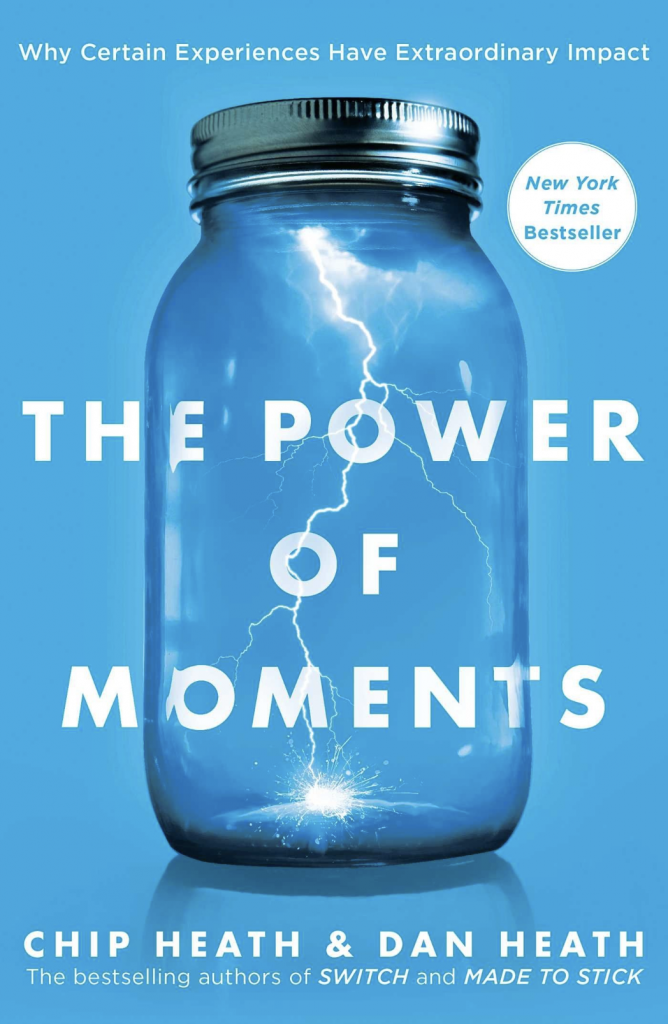Key Quote:
“If you want to be part of a group that bonds like cement, take on a really demanding task that’s deeply meaningful. All of you will remember it for the rest of your lives.” — Chip and Dan Heath
Key Points and Concepts
Defining and Thinking Moments
“A defining moment is a short experience that is both memorable and meaningful” (pg. 12), and it often includes these four elements:
• Elevation – the experience is heightened in a positive way.
• Insight – the person realizes something they didn’t know before.
• Pride – the moment to recognize and praise others for their achievement(s).
• Connection – the bond between people deepens and creates shared meaning.
We typically remember the peaks and the pits of life events, rather than just the beginning or end. Consequently, transitions such as moving into a new home, starting a new job, etc. are especially memorable and should therefore be given extra emphasis to be turned into “peaks” (pg. 9).
Psychologists have discovered that people “over-weight peaks in memory [because] … they serve as a kind of psychic price tag. They tell us, in essence, this is what it could cost you to endure that experience again” (pg. 120).
We add meaning to our lives by creating our own thresholds, both personally and societally. If you are struggling in a period of transition, you can manufacture a defining moment that clearly marks the divide between Old You and New You.
• New Year’s resolutions are not really about the resolutions themselves; rather, they are a mental trick we play on ourselves to define time landmarks. On December 31, people still desire to lose weight and read more, but they have less of a drive to do so. We should create similar time landmarks regularly to get over the self-created mental blocks that hinder pursuing our goals.
How Businesses Can Create Moments
In one survey about customer service, “almost 25% of the positive encounters cited by customers were actually employees’ responses to service failures: slow service, mistaken orders, lost reservations, delayed flights, and so on. When employees handled these situations well, they transformed a negative moment to a positive one” (pg. 29).
Many banks say they care about and prioritize the relationships they have with their clients; however, their actions might not necessarily reflect that value. Most people’s great “peak” and “pit” points in life center around money: hosting a wedding, buying a house, getting a divorce, etc.
What if banks purchased a single item off a couple’s registry when they got engaged, or gave a grace period of three months when a woman goes through a divorce process? Though this would be of little cost to the bank, it could have a huge pay-off relationally. There are many missed opportunities such as this in the business world to create significant peak moments for clients (pg. 40).
Reliability and competence usually meet customer expectations, but rarely exceed it in any company or industry. To exceed it, you “need the behavioral and interpersonal parts of the service,” or in other words, the element of surprise (pg. 55).
Breaking the script is part of elevating a moment to turn it into a defining one.
• However, the script must be broken consistently enough that it matters, but not so consistently that customers adapt to it and become resentful when a surprise is taken away (e.g., a coffee shop implements “Free Pastry Fridays” and customers become angry when the promotion ends).
Moments of elevation are hard to build, and they are easily delayed or watered down by “the soul-sucking force of reasonableness” (e.g., rationalizing that “Free Pastry Fridays” are an added cost, so temporary customer delight isn’t worth the monetary investment).
• At restaurant Pret A Manger, free giveaways are randomized and limited. Customers are surprised, and employees are satisfied. A good surprise is one that delights both customers and employees. “Breaking the script isn’t just surprise, it’s strategic surprise” (pg. 72).
• By simply disrupting routines, we create peaks.
In general, we underinvest in recognition. “80% of supervisors say they frequently express appreciation, while less than 20% of employees agree” (pg. 194).
• An easy way to improve retention rate is for employers to give out praise more frequently.
• Effective recognition is not systematized, but personal. “Employee of the Month” awards are too programmatic to be an effective way of praising others. At many companies, they become tacky and feel cheap.
How to Create Moments for Ourselves & Others
Though many moments of insight in our lives are serendipitous, Heath argues that such revelations are not entirely out of our control—we can engineer these moments for ourselves and others.
• In trying to decrease sickness caused by open defecation, one doctor went to an African village and performed a very simple but effective demonstration of dipping a strand of hair into a pile of feces then placing it in a cup of water and offering it to someone to drink. Of course, the receiving man was repulsed, but the point of the scenario was to demonstrate that the villagers have in fact been consuming each other’s feces for a long time, as flies transport fecal matter and disease much more than human hairs do.
The doctor did not teach the villagers anything they did not already know; they were aware open defecation was the cause of many health problems. However, they were unwilling to change their behaviors until they “tripped over the truth” of their reality. This would not have happened unless someone engineered the moment of enlightenment.
When people consider a goal, they often transform the task into one long race with a finish line at the end. However, incorporating many intermediate “finish lines” throughout the task makes the journey much easier to endure, and often produces better results (pg. 176).
• People are much less motivated to “learn Spanish” if their end goal is to “speak Spanish,” which is unmotivating and ambiguous. However, if someone creates mini-goals within their greater goal, such as “order a meal in Spanish,” “read an entire newspaper in Spanish,” and lastly, “speak Spanish at a conversational level with a native speaker,” the end result becomes much more realistic—and enjoyable—to achieve.
The promise of taking risks is not success—it’s self-insight and overcoming the fear of failure.
• Spanx founder Sara Blakeley grew to normalize failure when her father would ask her at the dinner table, “what have you failed at this week?” and express disappointment if there was no response. She worked as a salesperson for seven years, being rejected constantly,
and this in turn gave her the intelligent grit to pursue her Spanx idea in a world of male producers who didn’t understand the product. She was eventually named the world’s youngest female self-made billionaire for her Spanx idea.
People paralyzed by failure are not willing to take risks, which leads to mass amounts of missed opportunity to use great potential. People should aim to normalize failure by making it part of casual conversation, as Mr. Blakeley did.
People bond quickly when there are shared challenges. “If you want to be part of a group that bonds like cement, take on a really demanding task that’s deeply meaningful. All of you will remember it for the rest of your lives” (pg. 216).
Understanding someone and deepening a relationship doesn’t only require asking “What’s the matter?” but also, “What matters to you?”
(pg. 236).
Heath, C. and Heath, D. (2017). The Power of Moments: Why Certain Experiences Have Extraordinary Impact. New York: Simon & Schuster.

What if banks purchased a single item off a couple’s registry when they got engaged, or gave a grace period of three months when a woman goes through a divorce process? Though this would be of little cost to the bank, it could have a huge pay-off relationally.
When people consider a goal, they often transform the task into one long race with a finish line at the end. However, incorporating many intermediate “finish lines” throughout the task makes the journey much easier to endure, and often produces better results.
People paralyzed by failure are not willing to take risks, which leads to mass amounts of missed opportunity to use great potential. People should aim to normalize failure by making it part of casual conversation.
